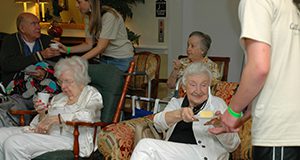Older Floridians, their families, and communities face many issues related to aging. This 8-page fact sheet focuses on the way aging affects nutrition and diet, and choices that older adults can make to improve or maintain their health and well-being as they age. Written by Linda B. Bobroff and Martie Gillen, and published by the UF/IFAS Department of Family, Youth and Community Sciences, revised March 2018.
http://edis.ifas.ufl.edu/fy628
Tag: Aging in the 21st Century program
Elder Nutrition
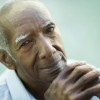 Good nutrition is important throughout life, starting even before we are born. However, at certain stages in life, such as infancy, pregnancy, and in older age, the importance of having good eating habits is especially critical. This 8-page fact sheet focuses on how aging affects nutrition and diet and choices that older adults can make to improve or maintain their health and well-being as they age.was written by Linda B. Bobroff and Martie Gillen, and published by the UF Department of Family Youth and Community Sciences, April 2014.
Good nutrition is important throughout life, starting even before we are born. However, at certain stages in life, such as infancy, pregnancy, and in older age, the importance of having good eating habits is especially critical. This 8-page fact sheet focuses on how aging affects nutrition and diet and choices that older adults can make to improve or maintain their health and well-being as they age.was written by Linda B. Bobroff and Martie Gillen, and published by the UF Department of Family Youth and Community Sciences, April 2014.
http://edis.ifas.ufl.edu/fy628
Designing Educational Programs for Older Adults (FCS2216/FY631)
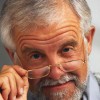 This 4-page fact sheet discusses marketing to older adults, location and timing of programs, and how to successfully share information with older adults. Written by Martie Gillen, Carolyn Wilken, and Jenny Jump, and published by the UF Department of Family Youth and Community Sciences, November 2012.
This 4-page fact sheet discusses marketing to older adults, location and timing of programs, and how to successfully share information with older adults. Written by Martie Gillen, Carolyn Wilken, and Jenny Jump, and published by the UF Department of Family Youth and Community Sciences, November 2012.
http://edis.ifas.ufl.edu/fy631
Adapting the Home (FCS2215/FY630)
 This 4-page fact sheet discusses AARP’s 10 basic ideas to increase home safety, how to individualize for each person or activity, how to apply universal design to make homes safer, and assistive devices. Written by Martie Gillen, Pat J. Dasler, and Jenny Jump, and published by the UF Department of Family Youth and Community Sciences, November 2012.
This 4-page fact sheet discusses AARP’s 10 basic ideas to increase home safety, how to individualize for each person or activity, how to apply universal design to make homes safer, and assistive devices. Written by Martie Gillen, Pat J. Dasler, and Jenny Jump, and published by the UF Department of Family Youth and Community Sciences, November 2012.
http://edis.ifas.ufl.edu/fy630
Fall Prevention (FCS2214/FY629)
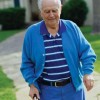 Among older adults (those 65 or older), falls are the leading cause of injury and death. When someone falls, they face long-term disability, lower productivity, and loss of independence. Falls can happen anywhere, but more than half of all falls happen at home. Many of these falls could be prevented by making simple changes in the home. This 3-page fact sheet was written by Martie Gillen, Kristen D. Smith, and Jenny Jump, and published by the UF Department of Family Youth and Community Sciences, November 2012.
Among older adults (those 65 or older), falls are the leading cause of injury and death. When someone falls, they face long-term disability, lower productivity, and loss of independence. Falls can happen anywhere, but more than half of all falls happen at home. Many of these falls could be prevented by making simple changes in the home. This 3-page fact sheet was written by Martie Gillen, Kristen D. Smith, and Jenny Jump, and published by the UF Department of Family Youth and Community Sciences, November 2012.
http://edis.ifas.ufl.edu/fy629
Financial Issues (FCS2212/FY627)
 Although we cannot foresee unexpected events, planning can help us control some financial issues that may arise. This 4-page fact sheet highlights the main financial poblems older adults face during retirements, and solutions to help plan and manage a successful retirement. Written by Martie Gillen and Josephine Turner, and published by the UF Department of Family Youth and Community Sciences, November 2012.
Although we cannot foresee unexpected events, planning can help us control some financial issues that may arise. This 4-page fact sheet highlights the main financial poblems older adults face during retirements, and solutions to help plan and manage a successful retirement. Written by Martie Gillen and Josephine Turner, and published by the UF Department of Family Youth and Community Sciences, November 2012.
http://edis.ifas.ufl.edu/fy627
Safe Return (FCS2211/FY626)
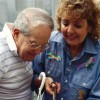 In the United States, more than 10,000 times each year a person with dementia becomes lost in the community and cannot find the way home. The quality of care people receive does not influence the likelihood of people with dementia to become lost. Even people who live in the best caregiving situations can become lost in the community. It can happen to anyone, even if the person does not have a tendency to wander. This 4-page fact sheet looks at why people with dementia become lost, how to prevent this from happening, and identify the best search strategies for finding someone who is lost. Written by Martie Gillen and Meredeth A. Rowe, and published by the UF Department of Family Youth and Community Sciences, November 2012.
In the United States, more than 10,000 times each year a person with dementia becomes lost in the community and cannot find the way home. The quality of care people receive does not influence the likelihood of people with dementia to become lost. Even people who live in the best caregiving situations can become lost in the community. It can happen to anyone, even if the person does not have a tendency to wander. This 4-page fact sheet looks at why people with dementia become lost, how to prevent this from happening, and identify the best search strategies for finding someone who is lost. Written by Martie Gillen and Meredeth A. Rowe, and published by the UF Department of Family Youth and Community Sciences, November 2012.
http://edis.ifas.ufl.edu/fy626
Family Relationships in an Aging Society (FCS2210/FY625)
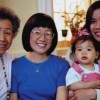 Never in the history of America or the world has the population had more older adults than children. This 5-page fact sheet discusses some issues that happen as a result of having a greater number of older adults than children. It also looks at the roles of the family and intergenerational relationships supporting our aging society. Written by Martie Gillen, Terry Mills, and Jenny Jump, and published by the UF Department of Family Youth and Community Sciences, November 2012.
Never in the history of America or the world has the population had more older adults than children. This 5-page fact sheet discusses some issues that happen as a result of having a greater number of older adults than children. It also looks at the roles of the family and intergenerational relationships supporting our aging society. Written by Martie Gillen, Terry Mills, and Jenny Jump, and published by the UF Department of Family Youth and Community Sciences, November 2012.
http://edis.ifas.ufl.edu/fy625
The Future of Aging Is Florida (FCS2209/FY624)
 Aging is not only about older adults. It is about their families, the community they live in, and the influence they exert on our society. Changing demographics have made the study of aging increasingly important. This 5-page fact sheet offers possible solutions to some of the issues we face as we “age in the 21st Century.” Written by Martie Gillen and Jeffrey W. Dwyer, and published by the UF Department of Family Youth and Community Sciences, July 2012.
Aging is not only about older adults. It is about their families, the community they live in, and the influence they exert on our society. Changing demographics have made the study of aging increasingly important. This 5-page fact sheet offers possible solutions to some of the issues we face as we “age in the 21st Century.” Written by Martie Gillen and Jeffrey W. Dwyer, and published by the UF Department of Family Youth and Community Sciences, July 2012.
http://edis.ifas.ufl.edu/fy624
